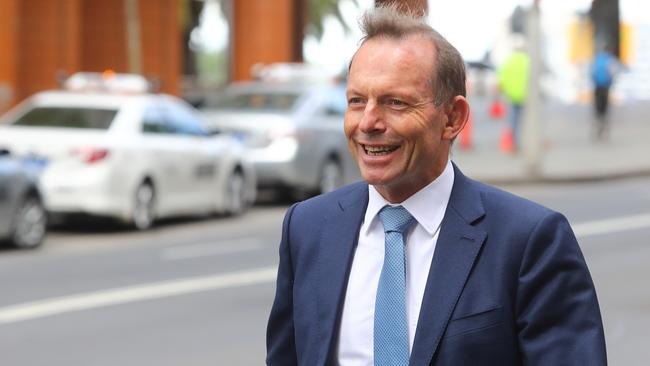Abbott and the awkward question on climate change

Years ago, I had a discussion with a senior member of the parliamentary Liberal Party about climate change.
The context was Labor’s emissions trading scheme, which at that time was being used by Kevin Rudd as a stick to beat Malcolm Turnbull, who was by then nearing the end of his term as opposition leader.
The Liberal said to me, “Look, there are probably three views inside the Liberal Party on climate change. One, climate change is bullshit and we should do nothing about it. Two, climate change is bullshit but if the public believe it and want an ETS, be it on their own head. Three, climate change is real and we have to act.”
At one point or another I suspect Tony Abbott has held all of these views, possibly all at once. The former prime minister’s contortions on climate policy have left him with zero credibility on the subject. It is the main reason why his climate speech in London was so breezily dismissed as an exercise in political opportunism, which of course it was.
But if you could get past the look-at-me glibness of Abbott’s language, what was left over was a thoughtful speech that deserved to be taken seriously.
For too long, too many on the right have been having the wrong argument on climate change. Instead of focusing on the wisdom of climate mitigation measures they remain mired in a debate about first principles. They think climate change is a hoax perpetrated by fraudulent greenies. The problem with this argument, aside from it being false, is that nobody is interested in having it any more.
In his speech, Abbott said the theory of human-induced climate change was not settled science, and insofar as climate theory cannot claim the same level of certainty as, say, the theory of gravity, he was right. The “science is settled” brigade - to borrow Abbott’s phrase - would have us surrender our critical faculties to others. This is not reason, but faith.
But the theory of how greenhouse gases warm the earth is plausible, the evidence that it is doing so is compelling and there is enough of it to start making policy. That is the near-unanimous judgment of the scientific community and poll after poll shows the public agrees.
Climate deniers - and I’m not saying Abbott is one - might win headlines with their obscurantism, but more than ever they resemble those Japanese soldiers caught in the jungles 30 years after the war ended. They’re fighting a war that’s just not there any more.
The important arguments are in the what-next category. This is where Abbott’s speech deserved to be taken seriously.
Do renewables pass the cost-to-benefit test? How accurate are the climate change models used to predict the specific effects of anthropogenic warming? Is climate change in all its forms an unmitigated catastrophe, as all reflexively assume, or might there be an upside?
On these questions there is huge uncertainty and ample room for debate, not just because the facts are uncertain, but because they involve making value judgments about competing social goods.
In his speech Abbott talked about increased Co2 levels greening parts of the planet, a point for which he was roundly criticised - although not, I note, contradicted.
It seems to me a richer vein would have been the inherent tension between poverty reduction and climate mitigation measures.
Human-induced climate change is the by-product of industrialisation. It was a hundred years ago, and it remains so today. Industrialisation has lifted millions out of poverty. It has transformed societies, most notably our own. It has saved countless lives and extended many more. It has created the conditions for the prosperous, leisured existence we take for granted and would presumably like to see extend to the billions of people who still live in poverty.
This begs an awkward question: are we really opposed to climate change in all its forms? What if coral bleaching on the Great Barrier Reef is the price we must pay for affordable energy in South Asia? What if renewables, for all their promise, can’t provide the horsepower required to lift millions out of poverty?
I have no answers to these questions. But to allow the climate lobby to have their head on them would be to invite disaster. A stable climate is a social good. But it is a good that must be set against other social goods - prosperity, energy security, social equity. It may be these ends are as one, but I doubt it. I suspect hard choices will be required.
Those choices belong to us all.






To join the conversation, please log in. Don't have an account? Register
Join the conversation, you are commenting as Logout